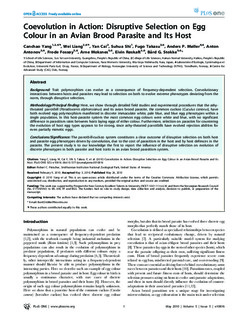Coevolution in Action: Disruptive Selection on Egg Colour in an Avian Brood Parasite and its Host
Yang, Chanchao; Liang, Wei; Cai, Yan; Shi, Suhua; Takasu, Fugo; Møller, Anders pape; Antonov, Anton Tinchov; Fossøy, Frode; Moksnes, Arne; Røskaft, Eivin; Stokke, Bård Gunnar
Journal article, Peer reviewed
Permanent lenke
http://hdl.handle.net/11250/2367511Utgivelsesdato
2010Metadata
Vis full innførselSamlinger
- Institutt for biologi [2575]
- Publikasjoner fra CRIStin - NTNU [38127]
Sammendrag
Background:
Trait polymorphism can evolve as a consequence of frequency-dependent selection. Coevolutionary interactions between hosts and parasites may lead to selection on both to evolve extreme phenotypes deviating from the norm, through disruptive selection.
Methodology/Principal finding:
Here, we show through detailed field studies and experimental procedures that the ashy-throated parrotbill (Paradoxornis alphonsianus) and its avian brood parasite, the common cuckoo (Cuculus canorus), have both evolved egg polymorphism manifested in discrete immaculate white, pale blue, and blue egg phenotypes within a single population. In this host-parasite system the most common egg colours were white and blue, with no significant difference in parasitism rates between hosts laying eggs of either colour. Furthermore, selection on parasites for countering the evolution of host egg types appears to be strong, since ashy-throated parrotbills have evolved rejection abilities for even partially mimetic eggs.
Conclusions/Significance:
The parrotbill-cuckoo system constitutes a clear outcome of disruptive selection on both host and parasite egg phenotypes driven by coevolution, due to the cost of parasitism in the host and by host defences in the parasite. The present study is to our knowledge the first to report the influence of disruptive selection on evolution of discrete phenotypes in both parasite and host traits in an avian brood parasitism system.
